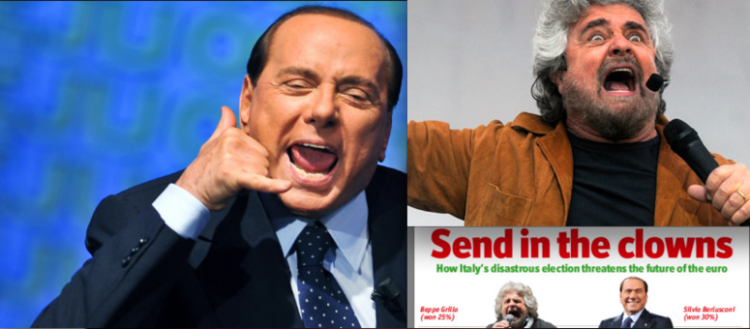


ROME.
"Send in the Clowns," urges the March 2 London weekly, the Economist, with cover photos of two Italians. One is a shaggy, shouting comedian-turned politician wearing a casual jacket; the other, a grinning media mogul-turned politician dressed in impeccably double-breasted navy blue. The headline: "How Beppe Grillo and Silvio Berlusconi threaten the future of Italy and the euro." The charge: "Confronted by the worst recession in their country since the 1930s and the possible implosion of Europe's single currency, the people of Italy have decided to avoid reality."
Some here (and not all by any means) have failed to grasp reality because reality is as complex as is explaining Italy to outsiders. A New York Times op-ed piece this week asked why former premier Berlusconi still appeals to voters, and gave the standard reasons: the soccer team, the life style, the jokes, l'uomo forte (the strong man). All true yesterday, but not today. When Silvio Berlusconi says that the spread does not matter, the uninformed believe him because they do not know a financial spread from a bedspread. What they do understand is the economic pinch, and the cost to their families of the austerity package Monti had to apply to keep the country from bankruptcy. Italy was thus caught in a Catch-22 situation, but many of those voting for Berlusconi believe he can help them to thrive again, now.
The circus metaphor came about because President Giorgio Napolitano, in Germany for meetings, learned that Peer Steinbrueck, former finance minister and political rival to Angela Merkel, remarked that he was "appalled that two clowns have won the Italian elections." The reference was plainly to Grillo and to Berlusconi, whose parties came in respectively first and third in last week's national general elections. Saying that this remark showed disrespect for Italy, Napolitano abruptly cancelled a dinner with Steinbrueck, and rightly so; in his role as president he must ever and always appear impartial, whatever his personal opinion. Later Steinbrueck phoned Napolitano, apparently to apologize.
While it may seem like a circus, at any rate, there is little to laugh about. Latest on the GDP (here called the PIL) has it sinking below 2% over the past year. A government that can handle the economic crisis, and the social crisis implicit in it, is necessary, but which government? Commentators here agree that no predictions can be made because "the situation is far too fluid." For one thing, the new Parliament to be seated in two weeks time will be drastically different from the seated Parliament of today, and no one can predict its behavior. Tuesday's definitive election results confirmed a four- way split among the leading parties, with Grillo's Movimento 5 Stelle (M5S) the strongest single party followed closely by Pier Luigi Bersani's Partito Democratico (PD) and, just behind, Silvio Berlusconi's Freedom party (PdL). Trailing far behind is outgoing emergency premier Mario Monti's ticket.
Because Bersani's coalition had more votes, his formation will be the largest in Parliament and, by a hair, also in the Senate. But as he himself has admitted, they may have won, but it was no victory. Indeed, the trouble is that no one else has actually won. Up-to-date surveys show that the huge turnout for Grillo came primarily from Bersani's ranks. Many were alienated because they see the PD represented by Bersani, Rosi Bindi and Massimo D'Alema as past its shelf life. The party appeared dynamic when it held primary elections three months ago, with the clever and attractive youthful Florentine mayor Matteo Renzi captivating many. When Renzi was shuttled aside, many voters - and not only the young - turned against the PD.
The result: today's PD is splintered, each faction proposing a different solution for a new government. Some are crying for Bersani to resign; others, for him to tough it out and hope that Napolitano will appoint him to try to put together a minority government. Others in the PD urge a broad coalition to form a new government, but disagree over potential partners. With everyone, in a broad coalition across the board? With Monti, whose interests tend to the right, to business and the Church? With Grillo, who is on record calling Bersani the walking "dead" and worse?
Berlusconi's solution to the crisis is to propose a right-left catch-all government, which his opponents dub an "inciuccio," or everybody suckling at the sow. Berlusconi is also calling for a piazza demonstration against the magistracy in late March. "A certain party of the judiciary wants to eliminate me," he said Thursday.
As for Grillo, he is aching to have new elections called so that his M5S can pick up more alienated voters. He refuses Bersani's timid advances, responding with vulgar insults and announcing that he himself will be premier. Fortunately, no new elections can be called immediately: by law the president cannot dissolve Parliament during the final six months of his seven-year mandate. If there are to be new elections, they will be called only after Parliament is dissolved, and hence only after a new president is seated mid-May. Who is to succeed Napolitano is vitally important, but no one can guess who he or she will be - indeed, so important that some are seeking, so far without success, a way to postpone Napolitano's departure.
And meantime Grillo is not without his own problems. A faction of his supporters are urging him to be responsible and work for a solution to Italy's problems; others are happy for him to go on protesting against corruption, a wicked and inept bureaucracy, financial cronyism and the destruction of the environment. Grillo has categorically forbidden his lieutenants to speak in public - only he can speak - but this totalitarian self-aggrandizement just may boomerang against him.
Source URL: http://test.casaitaliananyu.org/magazine/focus/facts-stories/article/facing-reality-in-circus-ring
Links
[1] http://test.casaitaliananyu.org/files/picture-61362169540png